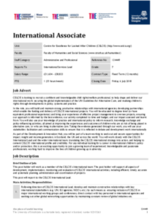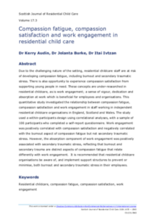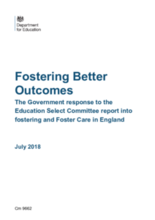Displaying 781 - 790 of 1177
CELCIS is looking to recruit a child rights/welfare professional, to help shape and deliver their international work: securing the global implementation of the UN Guidelines for Alternative Care, and realising children’s rights through developments in policy, systems and practice.
This quantitative study investigated the relationship between compassion fatigue, compassion satisfaction and work engagement in staff working in independent residential childcare organisations in England, Scotland and Wales.
This paper sets out the government’s response to two reports into foster care: The Education Select Committee Inquiry into Fostering and the Foster Care in England report, an independent review commissioned by the Department for Education. The response describes the government’s vision for foster care and improvements for the system, based on the recommendations of the two reports.
The study from the Special Issue on Adoption Breakdown of the journal of Research on Social Work Practice investigated whether sibling relationships influenced the outcomes of a sample of adoptive placements in England and Wales that had broken down postorder or were in crisis.
This paper adopts a life course perspective to explore well‐being amongst youth (18–25 years) who migrated as children to the UK and France.
This article from the Guardian describes the increasing fears of EU citizens living in the UK and providing full-time care to family members, who worry that they may be deemed "illegal migrants" and forced to leave the UK and their families.
This chapter will critically examine the difficulties faced by young people who are looked after by local authorities in accessing mental health services and argue, based on findings of recent Serious Case Reviews that there has never been a more dangerous time to be a looked-after child.
This paper outlines key findings from the first comprehensive study of permanence planning in Scotland.
Speaking at the launch of the care crisis review, a large-scale sector-led inquiry into the UK's care system, senior judge Sir Andrew McFarlane remarked that "it is easier to obtain a care order to take a child away from their family, than for the family to get support," according to this article from BBC News.
Recent budget cuts to early childhood and youth services will lead to an increased number of children "falling through the gaps" in care, says the children’s commissioner for England, according to this article from the Guardian.



